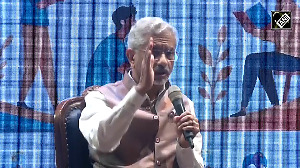The spread of the Taliban in Pakistan has senior American officials concerned about the safety and security of Pakistan's nuclear arsenal, including the potential for terrorists to get their hands on a weapon in transport or to infiltrate laboratories and nuclear fuel-production facilities, the New York Times reported.
The US believes that the arsenal, most of which is in southern Pakistan, faced no imminent threat.
President Obama said last week that he remained confident that the security of nuclear installations was a top priority for Pakistan's armed forces.
But all of Pakistan's nuclear sites are not known to the US, and its concerns have intensified since the Taliban entered Buner district, 100 km from Islamabad. The spread of the Taliban has left the US less willing to accept blanket assurances from Pakistan. Pakistani officials have not complied with American requests for more details about the location and security of the nuclear sites, the officials said.
Pakistan's reluctance is believed to come from a longstanding concern that the United States might be tempted to seize Pakistan's nuclear assets if the Taliban was about to surround areas near Pakistan's nuclear sites.
In public, the administration has only hinted at these concerns and expressed its faith in the Pakistani Army.
Pakistan has been sharply limited when the subject has turned to the vulnerabilities in the Pakistani nuclear infrastructure. The Obama administration has inherited from Bush a secret American program to help Pakistan build stronger physical protections around some of its nuclear facilities, and to train Pakistanis in nuclear security.
Much of the effort has fizzled out, and the US has never been able to see how much of the money was spent, where the weapons are kept or even a tally of how many nukes Pakistan has produced till date.
The facility Pakistan was supposed to build to conduct its own training exercises is running years behind schedule.
Zardari heads Pakistan's National Command Authority, the body responsible for its arsenal of nuclear weapons. But in reality, his control over the weapons is tenuous at best; that power lies with the army chief of staff, General Ashfaq Parvez Kayani, the former director of the Inter-Services Intelligence, the country's intelligence agency.
Officials are worried that insurgents could provoke an incident that would prompt Pakistan to move the weapons, and perhaps use a mole with knowledge of the transportation schedule to tip them off. That concern appeared to be what Secretary of State, Hillary Clinton hinted at in a testimony, before the House Appropriations Committee. Clinton had said that the weapons were widely distributed. Experts note that even as Pakistan faces internal strife, it is producing more plutonium for new weapons, and building new production reactors.
Pakistanis have always sought to dismiss fears for the safety of their nukes, as American paranoia, intended to dissuade them from nuclear modernization, but their reputation is dented by the fact that it used equal vehemence to denounce the reports that Abdul Qadeer Khan, one of the architects of Pakistan's race for the nuclear bomb, had sold nuclear technology on the black market.






 © 2025
© 2025